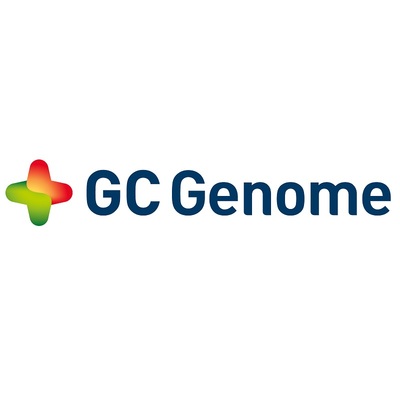GC Genome Corporation announced the publication of a new study in Radiation Oncology Journal, which demonstrates the feasibility of cell-free DNA monitoring to predict treatment response and detect minimal residual disease after radiation therapy in solid tumor patients using I-score, a tool for calculating genomic instabilities developed by GC Genome.
YONGIN, South Korea, April 9, 2023 /PRNewswire/ -- GC Genome Corporation, a leading genomic diagnostics company, announced the publication of a new study in Radiation Oncology Journal, which demonstrates the feasibility of cell-free DNA(cfDNA) monitoring to predict treatment response and detect minimal residual disease after radiation therapy(RT) in solid tumor patients using I-score, a tool for calculating genomic instabilities developed by GC Genome. The research was in collaboration with the Samsung Medical Center, Sungkyunkwan University School of Medicine. This study adds to the previous studies of prognostic effects of the I-score in various solid tumors, including hepatocellular carcinoma, esophageal cancer, and pancreatic adenocarcinoma1.2.3.
The study analyzed 23 plasma samples from cancer patients across a range of lung, esophageal, and head and neck cancer, and plasma samples from 358 healthy people were used as negative controls. Test performance was evaluated at serial cfDNA monitoring points: before RT, 1 week after RT, and 1 month after completion of RT using I-score, which represents chromosomal alterations across the genome(CIN) of cfDNA from Low-coverage whole genome sequencing(LC-WGS) data.
The result showed that pretreatment I-scores tended to be higher in larger tumors, and there was a significant positive correlation between the gross tumor volume and the baseline I-score. Another interesting finding is that minimal residual disease following RT was detected earlier by cfDNA than by imaging studies. And the serial monitoring of the I-score in the post-treatment 4 months case demonstrated that the change in I-score was observed before the progression of the disease was detectable through imaging studies.
"The findings of this study may have significant implications for the field of oncology, particularly for patients with lung, esophageal, and head and neck cancer," said Dr. Chang-Seok Ki, MD, CEO at GC Genome. "Further additional studies are ongoing to optimize the measurement and analysis of I-scores to predict radiation response accurately. The potential of cfDNA I-score as a monitoring tool in cancer treatment deserves continued investigation and attention."
[Reference]
1. Kim EJ, Im HS, Lee J, et al. Genome-wide and size-based cell-free DNA indices as predictive biomarkers for locally advanced esophageal squamous cell carcinoma treated with preoperative or definitive chemoradiotherapy. Curr Probl Cancer 2021;45:100685.
2. Oh CR, Kong SY, Im HS, et al. Genome-wide copy number alteration and VEGFA amplification of circulating cell-free DNA as a biomarker in advanced hepatocellular carcinoma patients treated with Sorafenib. BMC Cancer 2019;19:292.
3. Woo SM, Kim MK, Park B, et al. Genomic instability of circulating tumor DNA as a prognostic marker for pancreatic cancer survival: a prospective cohort study. Cancers (Basel) 2021;13:5466.
[About GC Genome]
GC Genome is a leading diagnostics company that aims to connect the care and cure to the world by offering genetic diagnosis services for Oncology, Pre&Neonatal, Rare Diseases, and Health Check-ups and suggesting personalized treatment for longer and healthier lives. The company was established in 2013 as a subsidiary of the GC group, a prominent healthcare organization worldwide. GC Genome operates a CAP-accredited laboratory and places the utmost emphasis on R&D. The company has forged robust partnerships with national hospitals and universities and has shown impressive growth momentum by steadily increasing its test volumes.
This press release may contain forward-looking statements, which express the current beliefs and expectations of GC Genome's management. Such statements do not represent any guarantee by GC Genome or its management of future performance and involve known and unknown risks, uncertainties and other factors. GC Genome undertakes no obligation to update or revise any forward-looking statement contained in this press release or any other forward-looking statements it may make, except as required by law or stock exchange rule.
Investor/Media Contact
Sohee Kim
shkim20@gccorp.com
Yelin Jun
yelin@gccorp.com
![]() View original content to download multimedia:https://www.prnewswire.com/news-releases/gc-genome-announces-publication-demonstrating-feasibility-of-liquid-biopsy-technology-to-predict-radiation-therapy-response-in-solid-tumors-301792959.html
View original content to download multimedia:https://www.prnewswire.com/news-releases/gc-genome-announces-publication-demonstrating-feasibility-of-liquid-biopsy-technology-to-predict-radiation-therapy-response-in-solid-tumors-301792959.html
SOURCE GC Genome





